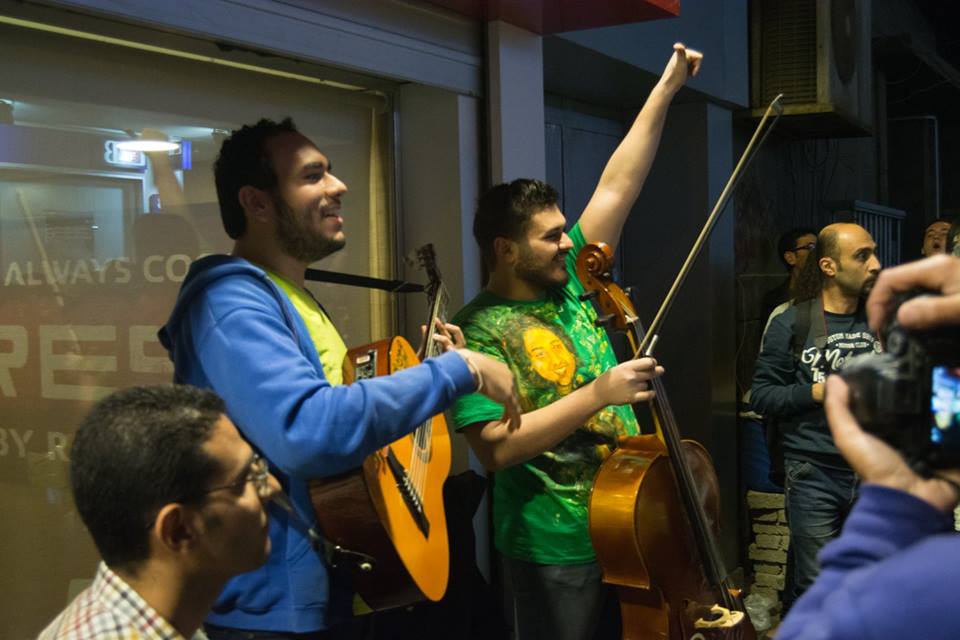Hungarians in Egypt did not miss the opportunity to celebrate the 60th anniversary of the Hungarian revolution (23 October – 4 November 1956) against the Soviet Union and the State Protection Authority of Hungary. Pál Maléter and Imre Nagy, who were the symbols of this revolution, were both executed in 1958.
Commemorating this historical event, Hungarian cultural counsellor to Egypt Renáta Kovács and Hungarian ambassador to Egypt Péter Kveck celebrated two events at Balassi Intezet—the Hungarian cultural centre in Egypt
The first event was a book signing on the occasion of launching the Arabic translation of “The 1956 Hungarian Revolution: Diary of the Revolution/ Diary of a Child”.
This diary was written by Csics Gyula at age 12. What makes this diary so special, is that it is uncommon to find a child who is conscious of the details of a revolution in his country. At a young age, Gyula opened his eyes to the historical and political importance of the Hungarian revolution.
Through the eyes of this innocent boy, the reader will experience the true events and facts of the Hungarian revolution: what he truly lived through at the time; what he heard from his parents and neighbours; what he heard on the radio; conversations with his friend; and what he read in the newspapers at the time.
Gyula wrote his diary in 1956 but it did not see the light until 2006.
In 2004, Hungarian historian Rainer M. János had a discussion about the revolution at the Central Bibliotheca of Tatabánya in Hungary. The director of this library was Gyula. After the discussion, Gyula handed János his diary telling him: “Maybe this will be of some importance to you.”
At this point, János thought: “What could a child of 12 years have to offer in writing about such a great revolution?” However, when János opened the diary, he realised that he has been handed a blessed gift.
The diary was translated into many languages; it was first welcomed in Poland where people also struggled against the domination of the Soviet Union.
Ten years after the diary was released in Hungary, it was presented to the Arab audience in Cairo, thanks to Egyptian translator Abdallah El-Naggar.
 The anniversary event was attended by Gyula himself, Hungarian professor László J. Nagy as an honorary guest, and El-Naggar to celebrate the launch of the book in Arabic and to facilitate the connection between the audience and the Hungarian guests.
The anniversary event was attended by Gyula himself, Hungarian professor László J. Nagy as an honorary guest, and El-Naggar to celebrate the launch of the book in Arabic and to facilitate the connection between the audience and the Hungarian guests.
The audience was eager to receive the Arabic version of the diary, signed by Gyula.
Afterwards, the audience was invited to a photo-caption exhibition about the revolution.
The second event was a screening of A berni követ (The ambassador to Bern), a political thriller based on real historical events. The movie was in Hungarian, along with German in some scenes, as its events occurred in Bern. For the Egyptian audience, the movie was subtitled in English. Directed by Attila Szásza, the movie is a fictionalised retelling of the attack on the Hungarian Embassy in Bern, Switzerland in 1958.
Over the course of 76 minutes, Szásza takes the audience to Bern to witness the taking of the Hungarian ambassador (a role interpreted by János Kulka) as a hostage for a few hours. The protagonists of this attack were Bános Tibor (József Kádas) and Takács Ábel (Tamás Szabó Kimmel).
Tibor and Ábel, two young Hungarian emigrants who left Hungary after the defeat of the 1956 revolution, took the ambassador hostage in an attempt to acquire the code book for deciphering embassy messages.
Although Tibor was killed and Ábel was caught by the police, the two succeeded in broadcasting some of the steps made to oppress the Hungarian revolution, through an interview with the hostage live on the radio. They also made the ambassador condemn the execution of Nagy in a statement. Outside the embassy, Hungarians gathered and cheered in support of Tibor and Ábel.
The film was first screened on 25 February 2014 to mark the unwelcome presence of the Soviet Union in Eastern Europe, as from 21-25 February in 1948, the Communist Party of Czechoslovakia, supported by the Soviet Union, took control over Czechoslovakia’s government—the beginning of a four-decade communist dictatorship over the country.
The film was shot over just 17 days; it received many awards, including: the Bronze Zenith Award – First Fiction Feature at the Montreal World Film Festival 2014; Golden Oosikar Award – Best Feature at the Anchorage International Film Festival 2014;
Best Film at the Hungarian Film Festival of Los Angeles 2014; Best Actor – Drama at the Hungarian Film Festival of Los Angeles 2014; Best Cinematography at the Hungarian Film Festival of Los Angeles 2014; Best Cinematography – TV Movie at the Golden Eye Film Festival 2014; Federico Fellini Award at the Tiburon International Film Festival 2015; 1st Prize – Feature Films at the Moscow Detective Fest 2015; and Best TV Movie at the Mecenatúra Award 2015.
The book launch and film screening deeply touched the Egyptian audience, as they related the tragedy of Eastern Europeans trying to rid their country of the Soviet dictatorship, to the revolutionary wave of the Arab Spring.




